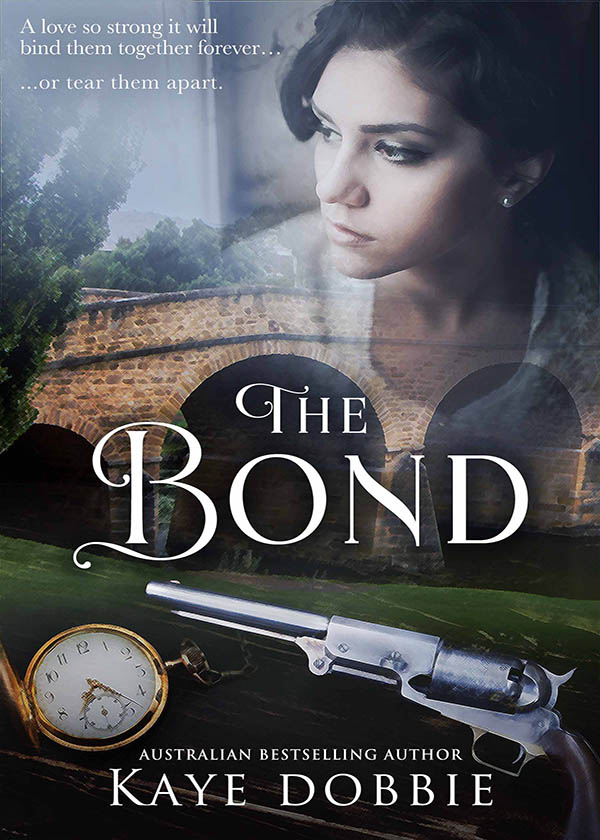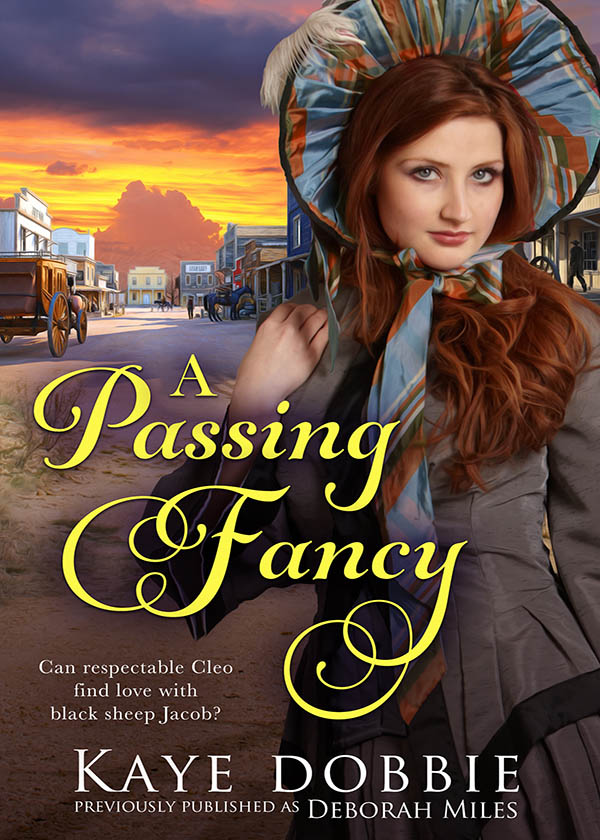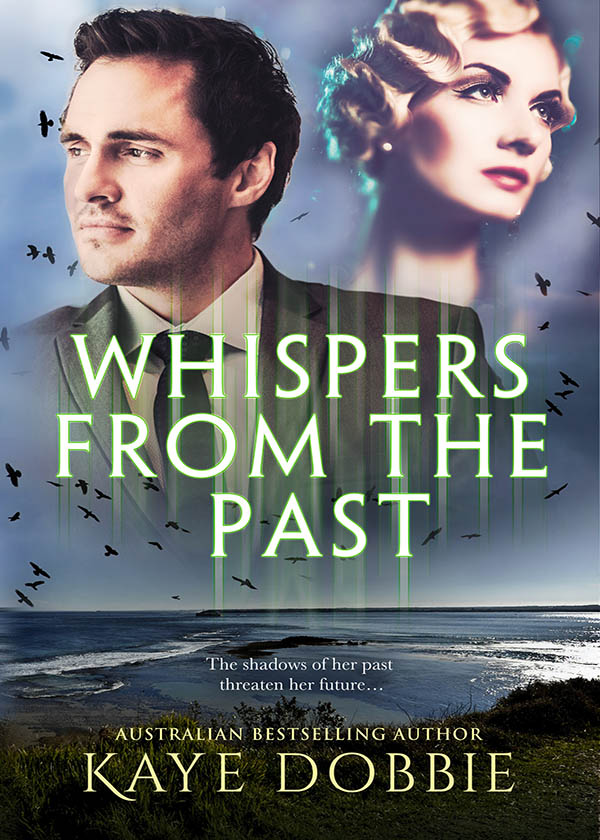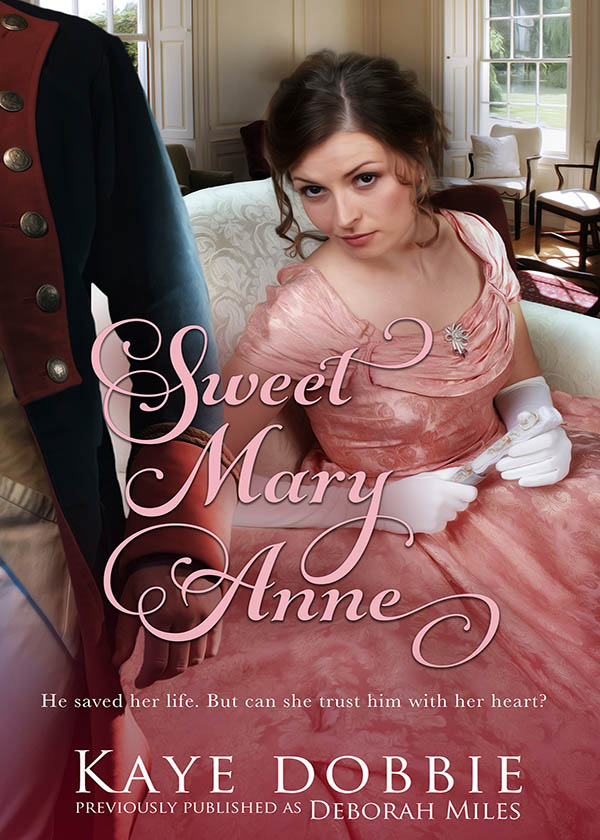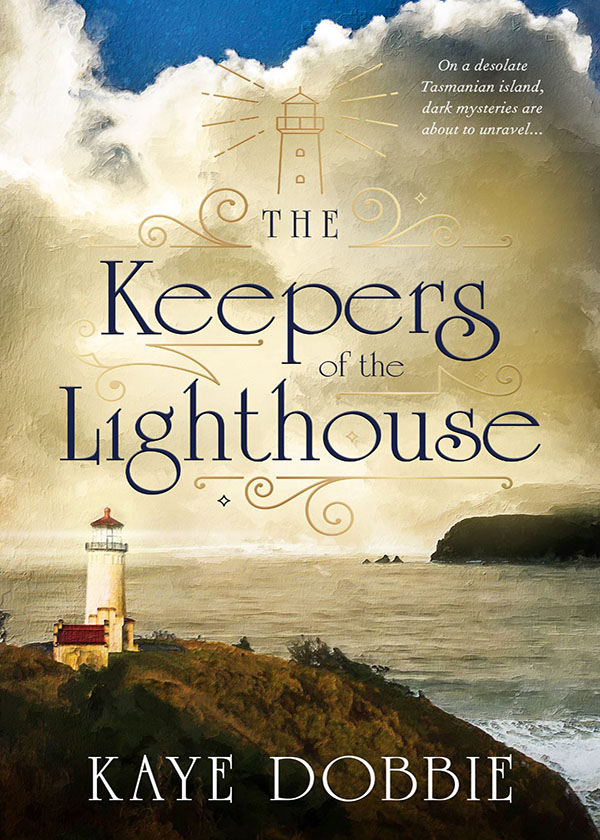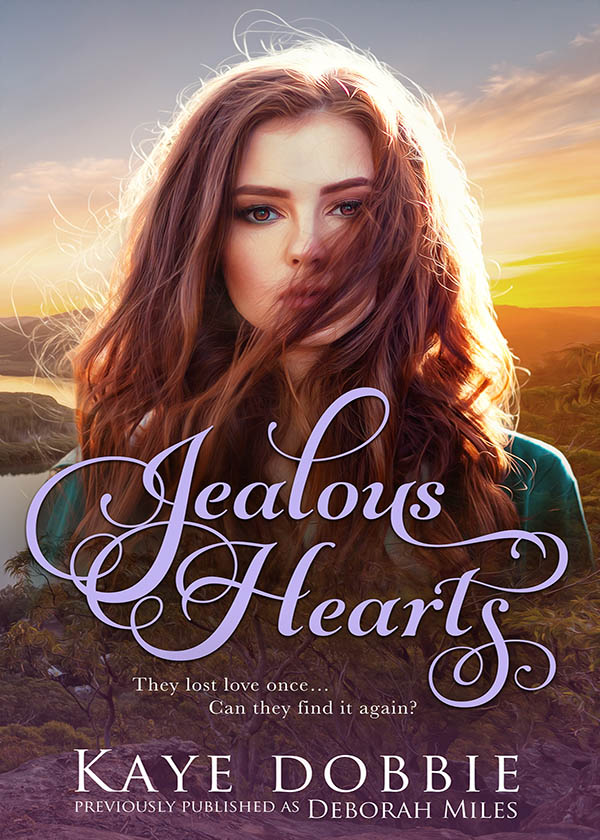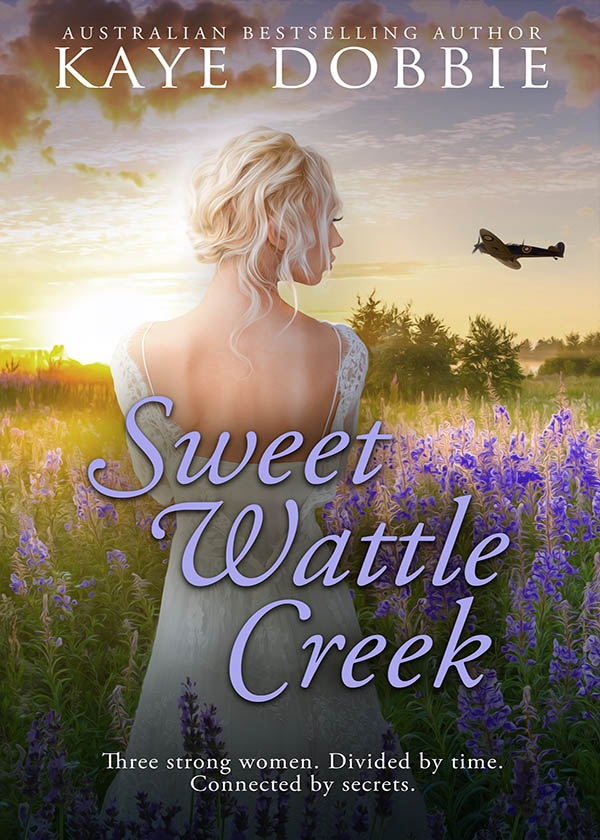- It begins with a wish made on Midsummer’s Eve, Richmond Bridge, Van Diemen’s Land.
Orphaned Rachel, daughter of a bushranger, doesn’t know that the man she falls in love with isn’t the hero she believes him to be. After they marry, their happiness is torn asunder when Will’s terrible secret is revealed.
With Will gone, Rachel travels to the Port Phillip District to make a life there. As the years pass, their lives separate and intersect, but always there is the bond. Like an unbreakable thread, it stretches between them, holding the promise of a happiness that seems just out of reach. In her loneliness, Rachel turns to another man, while Will returns to his origins, hunting down criminals and bringing them to justice.
Eventually fate brings them together again. Rachel, once more by Will’s side, longs to regain the love she once lost. But Will may never be able to put aside his hurt and forgive her, no matter how much he wants to. Can they resolve their differences at last? Can the wish Rachel made on that long ago evening finally weave its magic?
Excerpt of The Bond
PROLOGUE
Midsummer Eve, Richmond Bridge,
Van Diemen’s Land
RACHEL WRAPPED HER ARMS ABOUT
her narrow body, huddling herself against
the chill. The fury of the mid-summer storm had
lessened, the wind abating and the wild, whipping
rain easing to soft drizzle. The branches above her
head were dripping water down onto her hair.
She shook her head and pushed the leaves aside,
breathing in the cool, fresh smell of the earth.
Before her, through the long grass and reeds,
she could see the swirl of the river, swollen now
with the rain. Ducks were venturing out from
their hiding places for a last foray before nightfall.
A moment ago, she had watched with interest
as a man with a cart came down and watered his
horses, before heading on across the bridge. But he
hadn’t seen her, hidden as she was by the grass and
the low scrubby bushes at the river’s edge.
Behind her, Rachel could see the tangle of dark
smoke rising from the chimneys of the buildings
that made up the township of Richmond. The
orphanage was there among them and Rachel
turned her eyes determinedly away. The sun was
dropping lower, and its fading gleam struck a rainbow
on the shifting storm clouds. For a moment
she let her eyes rest on the mingling colours, wondering
if it were true what they said.
About rainbows and pots of gold.
She could do with a pot of gold. It would solve
all her problems. She hugged herself again, resting
her chin on her bony knees and closing her eyes.
Since Pa had gone—she still did not like to think
of him as dead—there had been no-one to care
about her future but herself. Once Pa had made
plans and decisions, once Rachel had no thoughts
in her head but the sunshine and the flowers and
the warmth of Pa’s coat as she lay sleeping, rocked
by the trot of his horse. But now Pa was gone, life
had taken a different, grimmer turn. These days
all she could think of was her narrow bed at the
orphanage and her tasteless meals and the other
girls with their eyes too big in their little faces.
It wasn’t fair, she thought, and blinked savagely at
tears. Why had Pa had to die? When he was all she
had? He had been a good man. Mrs Roadknight
said so, and Mrs Roadknight knew all her ‘boys’.
She fed them and dried their coats, wet from the
rain, and told the police she hadn’t seen any of
them in months with such a solemn, honest look
in her eye they couldn’t help but believe her, even
when they knew she was lying.
‘He never stole from the poor man.’ Mrs Roadknight
told Rachel. ‘Only the rich, and then he
were so courteous, they had no complaints. That’s
why it took so long to catch him, you see. No
one wanted him caught. But the reward . . .’ and
she shook her head, ‘ten pound is a lot of money,
Rachel. And some men being what they are . . .
One of them bounty hunters it was, finally tracked
him down.’
So Pa’s gallant career on the road had come to an
end. He had been shot while resisting arrest, and
so there was one less bandit to swoop down on the
little settlements and the lonely travellers, one less
bandit to annoy the authorities of Van Diemen’s
Land. Not that there weren’t plenty of others to
take his place! But Pa had been special. Even Mrs
Roadknight, who ran the End of the World Inn on
the road between Pitt Water and Jerusalem, and to
whom they were all special, thought he was a cut
above the rest. The inn was a notorious bushrangers’
stopping point, although the police could
prove nothing and were usually so undermanned
they did not even try.
When Pa had been killed, Mrs Roadknight had
taken Rachel in. The little girl was only five, and
for the next three years she remained there, slightly
neglected, but loved well enough and treated like
a little princess by all the ‘strangers’ who called on
Mrs Roadknight at odd times of the day and night.
Rachel learned from an early age to view the law
with suspicion, and believe wholeheartedly in the
myth of the bushranger—the gallant man ill-used
and ill-treated by a cruel society, who was compelled
to escape into the bush and live by pillage
and theft, evading the police as best he could.
In some cases it was true enough, but in others
the men who called themselves bandits or
bushrangers were savage and without conscience
of any kind, sometimes even a little deranged by
the cruelty they had endured in the convict camps
and roadgangs. Not that the child Rachel comprehended
such things. She just knew that there
were some men whose eyes frightened her, and she
stayed away from them.
The police finally decided they’d had enough of
Mrs Roadknight and closed down the inn on the
Jerusalem road. And Rachel, eight then, had gone
to the new orphanage in the growing township of
Richmond. She was no longer treated like a little
princess; she was just one of many little girls who
had been abandoned.
Rachel swallowed, lifting her head again. Her hair
had come loose as always and was wild down her
back. A thick, black cloud. The rain shone in it, like
droplets of silver. She loved the weight of it, pulling
at her neck. There was a rule at the Orphanage that
hair should be kept up under a bonnet at all times.
But there was no-one here to see.
‘Gypsy black.’ That was what Pa had called her
hair. It shone in candlelight with a blue sheen. Her
face was pale and would one day be a perfect oval,
but now it was too thin, too angular for beauty.
Her nose was straight, perhaps a little long, and her
eyes were dark and secret, slanting at the corners,
as black as her hair.
‘There’s Spanish blood in us,’ Pa used to tell
her. ‘One of our ancestors was wrecked from
the Armada, in Drake’s time, and found his way
to Devon.’ It sounded more romantic than being
called ‘gippo’ or ‘black’ as they travelled about Van
Diemen’s Land. For, when he wasn’t being a gallant
highwayman, Pa was a hawker … a tinker, selling
to the lonely wives and women of the settlements
throughout the island. Pa had a way with women.
Even then Rachel knew it. And knew some of
them came willing to his bed. But it was never
more than that. It was Rachel who was his companion,
his friend, his apprentice.
The light was fading fast. She would be missed
soon at the orphanage. She had her duties to perform—
helping with the cooking and the cleaning,
helping the smaller ones. Because Rachel was thirteen.
It was eight years since Pa had died, although
at night when she closed her eyes she could still
feel him close. The tears stung again. Usually she
held them back, but because she was alone in the
twilight, this time Rachel let them come.
She wept for a long time. It was so unfair! Pa
had been all she had and, although life had been
sometimes hard and uncertain, at least she had had
someone. It was the sense of belonging she missed
more than anything. The orphanage was so cold.
They were fed and clothed and generally looked
after, physically as well as spiritually—on Sundays
they made a long crocodile and walked to church
for their worship—but emotionally . . . she felt as
empty and desolate as the great craggy mountains
to the west. And for someone like Rachel, so warm
and eager to love, so desperate for love in return, it
was sometimes so unbearable she just had to escape.
Like now.
Just to be alone with her memories and her
thoughts, to regather her inner strength. To remind
herself who she was, a person in her own right,
rather than just another nameless body in an
orphanage uniform . . .
Suddenly behind her, a twig crunched. Rachel
glanced swiftly and nervously over her shoulder.
At first, she could see nothing. The darkness had
grown thicker in the moments she had been grieving
for the past. And then a shape moved, a figure
on a horse. The animal wickered softly, nuzzling
the long grass, and Rachel’s heart began to beat
with frightened thuds. It was dangerous out here
alone. There were ruffians; thieves and murderers
not so gallant as her father. Rachel crouched, ready
to run.
‘It’s all right,’ a voice said, soft and low with a
drawl she found familiar, a little like Pa’s. ‘I came
to water the horse and I heard someone cryin’. Are
you hurt?’
Rachel watched, wide-eyed, as the man urged the
horse closer. He was a dark shadow in the evening
shadows. She could not distinguish his features at
first, and it was only when he dismounted that she
saw him better, but still not well enough to colour
the hair flopping over his eyes. His shoulders were
broad from hard physical work, and his mouth and
jaw had a straight, stubborn look at odds with the
concern in his voice.
‘Are you hurt?’
She shook her head, and wiped her face with
her sleeve, scrubbing at it roughly, as if to eliminate
all traces of her weakness. ‘I was just thinking sad
thoughts,’ she told him warily.
He looked at her again, and the hard mouth softened
into a flicker of a smile. ‘What sad thoughts
would they be, darlin’?’
‘I was thinking of my Pa.’ She looked at him again,
slyly out of the slanting eyes, to see what effect that
was having. ‘He’s dead and I’m an orphan.’ Comprehension
came into his face. ‘You’re from the
orphanage,’ he said. ‘Should you be out here by
yourself?’
Rachel shrugged indifferently, but fear wormed
its way into her mind again, and she glanced rather
nervously towards the smoke from the town, now
a grey smudge in the dark sky. She would get into
trouble. There would be no supper for her tonight,
and probably she would be birched if Mrs Hewett,
who was in charge of them all, was angry enough
with her. And yet, she rarely got to speak to a man.
The orphanage was for girls only, run by females.
She missed the male attention she had had at Mrs
Roadknight’s inn, and she missed her Pa. This man
sounded rather like her Pa. She could not bear to
leave him just yet.
He was standing so quietly, as if lost in his own
thoughts. She looked at him curiously. ‘Are you
from the town? Have I seen you at church?’
He smiled. ‘Well, I don’t go all that often. Have
you always lived here?’ he added, shifting the subject.
‘We travelled all over, Pa and I,’ she murmured
softly. ‘He was a friend of Matthew Brady, or so
Mrs Roadknight said.’
She felt the man stiffen. ‘You mean the bushranger,
Brady?’
‘Yes.’ she sighed. ‘And my Pa was a gentleman,
too. He didn’t hurt anyone. He only took what he
had to, and he was always polite and always kind to
the ladies. But they caught him one day, the police
troopers and their hired killer, and shot him dead,
and so I was left all alone. I stayed with Mrs Roadknight
for a time, up at the End of the World Inn,
but the police closed her down, and she went to
her sister in Hobart Town. There wasn’t room for
me. So I came to the orphanage to live.’
He was silent for so long she wondered what he
was thinking. Usually, when she spoke of Pa and
Mathew Brady, there were cooes and murmurs of
excitement and admiration. But when the stranger
spoke again it was only to say, ‘Have you any other
family you might go to?’ His voice was a murmur
in the darkness, as though, she thought with a pleasurable
shiver, he was part of the darkness itself.
‘Not that I know of,’ she told him cheerfully. ‘Pa
never spoke of any, if I do.’ A breeze stirred the
leaves above her head, and she lifted her face to
its coolness. There were a few, faint stars now. ‘My
mother died when I was only a baby,’ she added,
and tried without success to feel sorrow. She had
never known her mother, and so could not miss
her. ‘Pa said she was already married to someone
else when he met her, and they lay together for
seven nights and then her husband returned and
Pa went away. But when I was born, my mother
died and told her husband the truth before she did.
He found Pa and handed me to him like a bundle
of old rags, so he said.’ And she laughed, for Pa
had made it sound so funny when he told her. ‘So
I have no Ma and no Pa, and that makes me an
orphan. That’s why I was crying.’
‘I can understand that,’ he said. ‘It’s not easy being
alone.’ There was bitterness now in his voice.
Perhaps he was one of the convicts, exiled from
home and loved ones, sent to be punished with
lash and hard labour? Or perhaps he was a settler,
who had travelled halfway around the world looking
for fortune and found only misery?
‘Have you any family?’ Rachel asked gently.
‘Not any more,’ he told her, and it was the sheer
expressionlessness of his voice that touched her
heart. His hand was resting on the branch near her,
and some impulse made her put her own small
palm over it.
‘Then we are two of the same,’ she told him, in
what was meant to be comfort.
He seemed surprised. She felt his hand twitch,
and then relax again under hers. ‘Maybe we are,’ he
said, and amusement warmed his voice.
‘Where are you from?’
He pushed back his fringe, and it flopped immediately
back over his brow. ‘I’ve been working over
Sorell way. I’m on my way home at last,’ and he
laughed with a mockery she couldn’t understand.
But she felt compassion and a sense of companionship
overcome her wariness for a stranger. For
whatever reason this man was alone and unhappy,
and something in him reached out to her as if they
were truly, as she had said, two of a kind.
Rachel looked up at the stars again, and suddenly
her mood lightened. ‘Do you know what night
this is?’ she asked him in a whisper that barely suppressed
the excitement in her voice. As though she
were about to present him with a gift.
He shook his head without answering.
‘It’s my birthday,’ she said. ‘I was born on Midsummer’s
Eve. My Pa used to say that Midsummer’s
Eve was a magic night—you know, old magic. He
said I could make a wish and it would come true.’
‘Have you ever made one?’ he asked her, and she
felt him move closer and squat down beside her.
‘Sometimes,’ she murmured, ‘but they didn’t
come true. Maybe I wished for too much.’
She saw him smile, bending his head, and tossed
her own indignantly. He looked up at the movement
and his eyes gleamed with a moist sheen that
made her wonder if he had tears in them. Was he a
ghost, a lost soul, uncared for and unwanted, come
to haunt the river bank? There was supposed to be
a ghost here, but she had forgot exactly what it was.
Rachel felt her skin prickle.
‘Don’t you believe Midsummer’s Eve is magical?’
she asked him quietly, her voice full of fright.
He took a moment to answer her. ‘My father
used to say I was a Moonraker, so maybe I do.’
Rachel tilted her head to one side, her fears forgotten.
‘What’s a Moonraker, sir?’
He laughed, and it was a warm laugh, the laugh
of a friend. ‘That’s someone who sees the moon’s
reflection in a pool of water and thinking the
moon itself is floating there, tries to fetch it out.’
Rachel sniffed. ‘A fool, you mean! Well, I will
make my wish, whatever you think.’ There was
a silence, while she did—I wish to see this man
again—and then wondered, irritably, why she had
wasted it on such a thing. She should have wished
for something like a pot of gold, or a loving home
and family.
‘What did you wish for?’ he asked her, trying to
make his voice serious.
Rachel bit her lip. She would not tell him the
truth. He would laugh at her. Instead, she spied the
horse, still cropping the grass, and smiled. ‘I wished
you would take me for a ride on your horse,’ she
told him slyly.
He seemed to be considering it, and then he
stood up. ‘Why not?’ he mocked, as if to himself.
‘It’s not often I can make someone’s wish come
true!’
Rachel’s heart leapt. He mounted, and held
out his hand, reaching for hers. Without a second
thought she gave it to him, feeling his fingers close
hard, and then he had pulled her up into the saddle
before him, his strong arms either side of her. She
felt his breath in her hair, and turned her head to
meet his eyes. His hands tightened on the reins,
and the muscles in his arms hardened. ‘Where do
you want to gallop to?’ he asked her evenly. ‘Will
we go to Hobart Town and back, or on and on into
the sea?’
Rachel laughed, hearing the edge of excitement
in his voice, although he strove to hide it, matching
her own. ‘The sea!’ she cried.
He kicked his heels savagely into the horse’s
flanks and set it speeding away, down the road.
The wind was in her face, streaming her hair out
behind her, making her cheeks sting and her eyes
smart. Neither of them spoke. The rain had cooled
the air, and it was delicious and so exhilarating,
she felt as if she were flying. In all her young life
she had never felt like this, riding like the night
wind with this stranger. The excitement twisted in
her, making her laugh out loud, and his arm tightened
about her so that she was pressed hard against
him. The horse stumbled, but somehow he held it
upright, and she felt the power of his body with a
sense of wonder. She felt small and protected, as if
her father was with her again, only different in a
way she couldn’t understand. Rachel pushed her
hair out of her eyes and smiled to herself. I’ll never
forget this moment, she thought. Not as long as I
live. When I’m old, I’ll still hug it to myself, and
remember.
After a while, she realised he had slowed the
horse to a trot. It was puffing and blowing, its sides
heaving. It could not be an easy thing, she thought,
carrying the two of them. In dismay, she saw the
lights of Richmond before them, and knew their
journey had come to an end. He kicked the horse
into a canter again, and its hooves flicked up mud
and grass along the riverbank. Some water birds
flew up, squawking their displeasure at being disturbed
so late, and Rachel turned, laughing, to
meet his eyes.
He paused a moment, hesitating, and then suddenly
he leaned forward. His lips brushed hers in
the darkness, warm and soft. Rachel was so surprised,
she did not move, and felt his smile even
though she could not see it. ‘You’re a lovely girl,’
he told her. ‘I’m glad I could make your wish come
true. Now you’d better be going, or you’ll be in for
trouble.’
Reluctantly, Rachel slid down. ‘Will I see you
again?’ she asked him. ‘Will you come back again?’
He smiled. ‘Maybe I’ll be here next Midsummer’s
Eve to grant you another wish, darlin’!’
She laughed, as he had meant her to. She moved
away, backwards, still watching him darkly silhouetted
on the horse against a sky which was now
full of stars.
‘What’s your name?’ he asked her suddenly.
She had started to run, back the way she had
come. ‘Rachel, it’s Rachel,’ she called, her voice
fading in the darkness. And she ran on, skipping
and laughing, not caring that when she returned
there would be angry faces and she would go to
bed sore and hungry. It was her special secret, and
she hugged it to herself, and thought of it often
and never forgot it. And although she was by the
river the following Midsummer’s Eve, waiting in
the darkness with fast beating heart, he did not
come. And she wondered if he had been a ghost,
after all.

